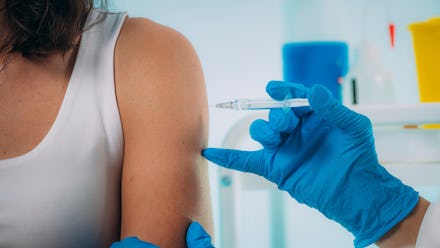Yes, the coronavirus vaccine can cause an allergic reaction. No, you shouldn't worry

This December, the hard work of scientists around the world has brought the first round of COVID-19 vaccines, which will be crucial to our return to "normal." While some people are excited, some fear what could happen if they take it, for both science-based and well, more unfounded reasons. (Here's lookin' at you, anti-vaxxers.) Recent news out of the U.K., the first country to administer the approved Pfizer vaccine, might not help either party: A few recipients are having allergic reactions to the vaccine. I wouldn’t panic about this happening to you, but here are all the details so you stay informed.
On Wednesday morning, December 9, U.K.'s National Health Service reported that two recipients of Pfizer and BioNTech's COVID-19 vaccine had adverse reactions Tuesday, the first day the vaccine was administered to the general public anywhere in the world. The recipients, both healthcare workers, both had a history of severe allergies, and when both reacted badly to the vaccine, they both used their own adrenaline autoinjectors (a.k.a. an EpiPen) to stave off whatever allergic reaction they were having.
These healthcare workers were prepared for the possibility that they would have a bad reaction, and both reportedly had a specific one — an anaphylactoid reaction — associated with receiving the vaccine. An anaphylactic reaction is characterized by skin rash, nausea, vomiting, difficulty breathing, and shock, among other symptoms.
Pfizer’s own vaccine information leaflet describes potential adverse reactions to the vaccine, which include “itchy skin, rash, shortness of breath, and swelling of the face or tongue,” all of which are typical of allergic reactions. Keep in mind that this vaccine, unlike Russia’s, has gone through a clinical trial and was deemed safe for the general public after being administered to 43,661 volunteers.
While we don’t have an exact number of how many people have been vaccinated so far, BBC reports that 50 hospitals around the U.K. began administering the vaccine yesterday, and by now that number is probably way higher. The fact that only two people reported adverse reactions is pretty good news if you think about it — and it’s not unexpected, either.
So, anyone getting their bunker and Michonne-approved katana ready for a Walking Dead-type apocalypse scenario need not panic, because officials already knew this would happen to a few people.
"As is common with new vaccines the [Medicines and Healthcare products Regulatory Agency has] advised on a precautionary basis that people with a significant history of allergic reactions do not receive this vaccination," says Stephen Powis, the national medical director for the NHS in England. Doctors warn not to take the Pfizer vaccine if you've had previous allergic reactions to vaccines, and anyone with a history of significant allergies to food or medicines should avoid the Pfizer COVID-19 vaccine in its current state.